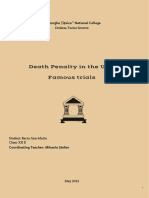The Executioner: The Chronicles of a Victorian Hangman
by Colin Wilson
Can you imagine the type of person capable of a full-time profession in executing
people? The emotional and ethical dilemma one would have to fight, pulling the level, over and
over – ending the lives of the young, old, man and woman. A man by the names of James Berry
carried out 131 hangings in his seven years of office. This book, The Executioner, is a fantastic
read, with hundreds of stories inside of the Victorian era London and the horrors taking place in
the dark. It takes you into the mind of a troubled man turned empty. The evolution of his career
and outlook on life is fascinating and unfortunately depressing.
James Berry had a rough upbringing filled with rebellion and various punishment. In his
early adult years, he tried and failed in many professions during the late 1870’s. Consistently
finding new jobs as apprentices, he couldn’t stick with anything. He realized his interest for law
enforcement and became a police officer. As his career advanced, he realized there was a rare
opportunity ahead. An executioner by the name of William Marwood, who served from 1874 –
1883, was stepping down. He was seen by Berry as a sort of mentor from whom he gained most
knowledge relating to his grim occupation. Berry was married with a family so this new venture
was important to him and he was sure to see this through. He rationalized with himself and said
he was an agent of the law, not a murderer killing murderers. (Dexter! Voice snippet from
Famous Dex)
“As what may undeniably be termed a professional killer, an executioner was in a unique
position among those who could legally take the life of another. Soldiers, for instance, may be
called upon to kill in the defense of their country, but such killing is usually done in the heat of
battle and usually with a detached remoteness not afforded the executioner. The personal contact
�with his “victims”, the fixed time of execution, the ritual and the times thus allowed for
pondering his actions all took their toll on Berry.
One of the earliest hangings Berry carried out was a woman charged for poisoning her
husband’s food with arsenic. She begged for mercy and claimed innocence but it was not Berry’s
place to question the decision of the verdict. Sometimes the convicted would confess to him and
he cherished this peace of mind. Having hung her; Berry felt much grief and hoped she was lying
and that he in fact did deserve this ultimate form of penance. In 1861 treason and murder were
the only crimes worthy of hanging someone. Killing her agonized him and he questioned his
career choice already. “According to Berry, nine years later a farmer on his deathbed confessed
to poisoning the husband. He had crept into their house, poisoned the food and left.” The woman
who Berry hung was innocent. He knew he had no legal say in the end, but the guilt weighed on
his soul throughout this career.
What was fascinating to me reading about hangings was the way they truly died. Because
in pop culture tv/movies suicide by hanging is strangulation, it’s easy to forget their method was
never suffocation. If you hung yourself, you would struggle to breathe and die from
asphyxiation. The hangings performed in this time, dropped you at a calculated measurement, so
the weight of your body would dislocate your vertebrae from your neck for a painless death.
Hangman were almost celebrities at this time in history – there was much controversy on
the justification of this career but regardless the attention was present. The news often covered
any mistakes or as they liked to call it “bungled executions”. Now referring back to the method
of dropping the criminal - the weight of the person was calculated with corresponding distance.
There are numerous stories where the weight was incorrectly measured so the drop was either
too short or too long. If it was too short, the person wouldn’t die a painless death – instead they
�would hang and struggle as they choke to death. If the drop was too long? Well, here is a passage
from the book what happens then...
“Moses Shrimpton had died a painless and instantaneous death, but an old man, his
weight had been difficult to judge and the warders had not given me the correct information. I
had given him what I thought a proper drop but evidently it had been too much. What Berry
failed to describe was that the long drop given to Shrimpton had caused his head to be almost
severed from his body. The walls of the pit were splashed with blood, which was also running
down his body. Reports of the bloody death appeared in the press, but since the death had been
instantaneous, painless and the result of a legal hanging, there appears to have been no real
criticism at the inquest.
Yikes. The bigger they are the harder they fall. What was cool to learn about the
hangman was that the night before he was scheduled, he would stay at the prison, normally after
hitting the pub. So “having the hangman in a pub was a great bonus for the landlord as it
attracted customers curious to see this ‘public official’ and it was not unknown for the hangman
to hold (gatherings) to recount his tales to an enthralled and drink-buying audience. Hangmen
were always keen to supplement their income in those days and this was one way to do it. (Insert
Geralt from The Witcher in the bar being pestered). Another long-established ‘perk’ for a
hangman was to sell his used ropes, either as a piece or complete. This is straight up murderbelia.
Murderbelia is a term identifying collectibles related to murders, homicides, the perpetrators or
other violent crimes. You can go online and find things for sale and its completely legal. Morbid
as hell, but legal. I’ll get into detail about this another time.
Another complexity of this job was who he reported to. It was a weird relationship with
expectations not being met and arguments. “The secretary of state has no authority to control the
�movements of the executioner, who is engaged and paid solely by the Sheriff, as the officer
solely responsible for the carrying out of the execution.” Basically, Berry was continuously
traveling all over the UK working with local sheriffs/prisons setting up and taking off after
executions. The higher form of government, above the sheriffs, didn’t want Berry in the pubs
drinking with commoners exploiting a government assigned role. They were concerned with the
public imagine of the hangman, but they couldn’t really enforce that.
Some of the stories in this book were unbelievable and one in particular was just sad.
When someone was found guilty and had a hanging planned – Berry never knew if they would
go willingly. Some would admit fault, get right with God and walk peacefully to the gallows. In
this story, the man was a coward who made an awful scene. The wail of the prisoner was
heartbreaking and many left while watching the struggle to get him even close to the end. His
screaming and crying wouldn’t stop and four workers had to force him to the door. It was said
that when he saw the scaffold his terror was turned to madness. This was traumatic for Berry and
when they all dragged this man kicking and screaming, they rushed the drop when the noose was
placed. “Witnesses were horrified to see the rope jerk upwards as the man disappeared from sight
and it appeared for a moment that the noose had slipped from his head or had broken. However,
the rope had severed the head entirely from the body, and both had fallen together to the bottom
of the pit.”
It was said that after this hanging Berry decided to hand in his resignation. That was one
of the many times he said he could not continue yet still he persevered. One of my favorite parts
of this book was getting to know James Berry’s humor. It was often he found himself lying on
public transportation who he was to prevent public criticism. One interaction recorded on a ferry
crossing from Ireland went like this.. “One of the passengers was terribly ill with seasickness and
�a toothache, providing such a nuisance to his fellow passengers and the stewards that, Berry
surmised, one of the latter referred the suffering man to Berry for a cure. Begged for advice,
Berry admitted that he was ‘in the habit of giving drops that would instantaneously cure both the
toothache and the sea-sickness, but assured him that he would not be willing to take my remedy’.
The man persisted so Berry handed him one of his cards ‘and as a sensitive man it gave his
nerves a shock that was quite sufficient to relieve him of the toothache, and me of his presence
for the rest of the voyage.’ (Sunglasses/joint gangster meme on James Berry photo.)
His career was quite steady and he hung many people in places all over England,
Scotland and even reaching into Ireland. There was much hate for an Englishman to come into
Ireland and hang one of them. There has been turmoil between the UK for a very long time and
they sure loathed his presence on their land. (Insert McGregor cussing snippet). He feared for his
life on almost all the trips to Ireland, it was that serious.
Towards the end of this book, I thought it was almost unfair what the secretary of state
and sheriffs expected of Berry. The years of being away from family, emotion trauma of killing
people guilty or innocent, fearing for his life on trips and operating anonymously at times –
Berry was still constantly questioned. He was defending himself and this excerpt explains it
perfectly. A little context first, Berry performed a hanging and after inspection of the body they
found a gash in the front neck – so he was called to take the stand. “Berry was obliged to
describe his actions and methods in some detail, and in a public forum. It also reveals his way of
reacting to criticism, and the impact of his stubborn and self-important character. Though the
coroner was in charge, he obviously realized the futility in arguing with the executioner and so
closed the matter before it got out of hand. Berry had the last word.”
� I had his back on this one, his job is not easy at all, and the man they convicted was
hung, did they really need to inspect it after and scold or question him too? He wasn’t some
sicko enjoying killing people. What Berry did like, was attention though. The story goes that the
committee had heard he was back in bars, getting wasted with people, telling stories and selling
used ropes. “This led to the requirement for the hangman to remain in the prison on the eve of
the execution and to the rationing of alcoholic consumption.” Some people like the phrase it’s
better to ask for forgiveness then permission.... The love/hate relationship the general public had
on the public executioner was odd. The criticism and rebuke were prevalent but also it states they
could be revered as national heroes.
One killer he had the privilege to hang (I say privilege because she was a piece of shit)
was an absolutely horrible woman. She was charged with murdering children. She was a so
called ‘baby-farmer’ a despicable breed of murderers who for cash took unwanted babies into
‘care’ and subsequently disposed (i.e., killed) them. She would adopt them, receive the money
and strangle them.
Towards the end of his career, he apparently hanged a gorgeous woman which truly
bothered him and following that hanging, another mishap that was out of his control, occurred.
“It was immediately evident that a mistake had been made. On looking into the pit, it was seen
that the victim’s head had been all but torn from his body, blood gushing from his neck ‘in
torrents’. His clothes were completely saturated and the noise of blood cascading on the paving
of the pit could be heard all over the execution chamber. It continued to pour down like a
fountain and those present could hear the sound as long as they remained near the scaffold. Berry
was told the doctor had final say in the length of the drop, so he agreed. The sight was apparently
�the most horrifying description that has ever been seen at an execution in that city. Berry made
up his mind there that he would never hang another man.
After Berry was officially no longer employed the story goes, everything the government
didn’t like about his methods changed, moving forward. The freedom of speech and actions he
enjoyed would never again be seen in the kingdom. Over a decade past and after everything
Berry went through it was sad to read how he was stuck fighting alcoholism, depression and
gambling. He considered his past wicked and tried to drink away his demons. During this time,
he said “I wish I were dead and off the face of this earth. There was nothing but death and
destruction staring me in the face.” In his drunken thoughts, he decided to continue even though
fifteen years had passed already. They quickly rejected him saying there was no reason to engage
with him after all the trouble he caused them.
Unfortunately, things got much worse for Berry and he decided it was time to take his
own life. After a career in death, retirement was not pleasant. He was feeling disgusted with
himself but his wife caught him and tried to take anything he could use to harm himself. What I
thought was fascinating was the book said suicide and attempted suicide were criminal offenses
at the time?? His wife threatened to turn him in, which in my mind definitely didn’t help the
situation? Berry wrote this:
“I could not have thought it possible that mortal man could become so low and depraved.
I could not sleep at night: I could not rest by day. My burning conscience accused me of having
wronged my family: - my innocent, good and virtuous wife, and my sorely suffering children –
with my carryings on in sin and wickedness. There was nothing else for it. I must put an end to
my life.”
� Berry once again made his decision to end his life and decided to take a train and throw
himself out of the window as it passed through a tunnel. This is my favorite part of the story. As
he waited for the train, he noticed a bookstall with a story covering an evangelist in town by the
name of Evan Roberts. He bought the paper and read it and suddenly reflected on his entire life.
He felt remorse for his coming sin and called to God for forgiveness. A man joined him on the
bench with the same paper in his hand. Making conversation, the man said God led him to speak
to Berry seeing the visible grief he displayed. The two of them connected, sharing stories and
wept for one another’s hardships. Berry thought he was unforgivable but agreed to go to church
with him. Berry’s story then turns dramatically.
He was saved from self-destruction and was to spend the last years of life far more at
peace with himself and the world. Berry had written a book on his called “My Experiences as an
Executioner” which was a memoir from 1852 - 1913. After he changed his life, he wrote a new
book “Mr. J Berry’s Thoughts Above the Gallows”. The second book fought against the death
penalty and was seen as Berry’s way of purging himself.
This book was a monster of a read for me, it was over 400 pages and took me weeks. The
Executioner was a great book and I would recommend it to any Victorian era fan like myself.
James Berry was an interesting man who had a bizarre and fascinating life experience on earth.
Thanks for watching.























































































